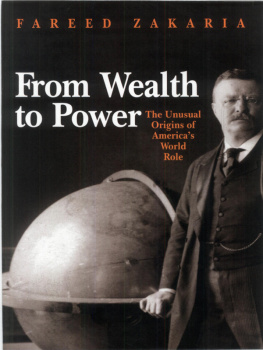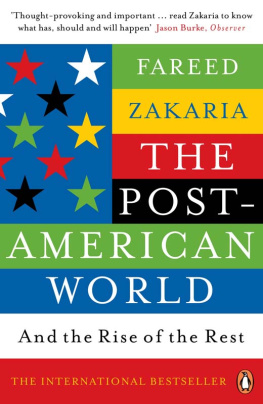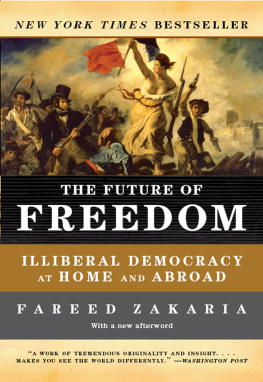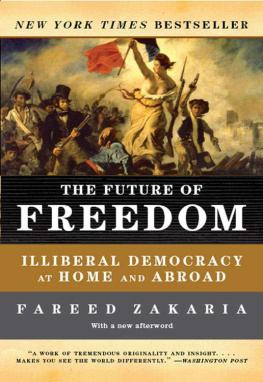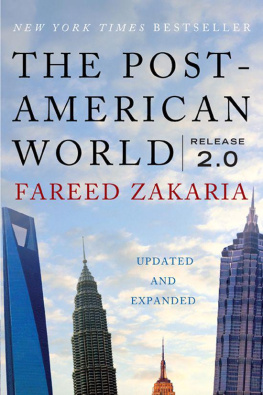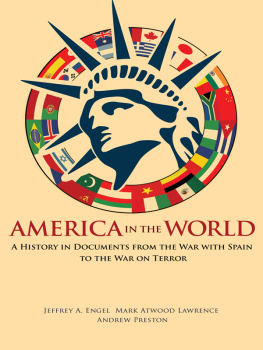FROM WEALTH TO POWER
PRINCETON STUDIES IN
INTERNATIONAL HISTORY AND
POLITICS
Series Editors
Jack L. Snyder, Marc Trachtenberg, and Fareed Zakaria
Recent titles:
The Moral Purpose of the State: Culture, Social Identity, and
Institutional Rationality in International Relations by
Christian Reus-Smit
Entangling Relations: American Foreign Policy in Its Century
by David Lake
A Constructed Peace: The Making of the European Settlement, 1945-1963 by Marc Trachtenberg
Regional Orders at Century's Dawn: Global and Domestic Influences on Grand Strategy by Etel Solingen
Prom Wealth to Power: The Unusual Origins of America's World Role
by Fareed Zakaria
Changing Course: Ideas, Politics, and the Soviet Withdrawal from Afghanistan
by Sarah E. Mendelson
Disarming Strangers: Nuclear Diplomacy with North Korea
by Leon V. Sigal
Imagining War: French and British Military Doctrine between the Wars
by Elizabeth Kier
Roosevelt and the Munich Crisis: A Study of Political Decision-Making
by Barbara Rearden Farnham
Useful Adversaries: Grand Strategy, Domestic Mobilization,
and Sino-American Conflict, 1947-1958
by Thomas J. Christensen
Satellites and Commissars: Strategy and Conflict in the Politics of Soviet-Bloc Trade
by Randall W. Stone
Does Conquest Payf The Exploitation of Occupied Industrial Societies
by Peter Liberman
Cultural Realism: Strategic Culture and Grand Strategy in Chinese History
by Alastair Iain Johnston
The Korean War: An International History
by William Stueck
FAREED ZAKARIA
From Wealth to Power
The Unusual Origins of America's World Role
PRINCETON UNIVERSITY PRESS
PRINCETON, NEW JERSEY
Copyright 1998 by Princeton University Press
Published by Princeton University Press, 41 William
Street,
Princeton, New Jersey 08540
In the United Kingdom: Princeton University Press,
Chichester, West Sussex
All Rights Reserved
Fourth printing, and first paperback printing, 1999
Paperback ISBN 0-691-01035-8
The Library of Congress has cataloged the cloth edition
of this book as follows
Zakaria, Fareed.
From wealth to power : the unusual origins of
America's world role /
Fareed Zakaria.
p. cm.
Includes bibliographical references and index.
eISBN: 978-1-40082-918-7
1. United States Foreign relations 1865-1921. 2. International relations. I. Title.
E661.7.Z35 1998
327.73-dc21 97-34245
This book has been composed in Sabon
The paper used in this publication meets the minimum requirements of ANSI/NISO Z39.48-1992 (R1997) (Permanence of Paper)
http://pup.princeton.edu
Printed in the United States of America
10 9 8
To my parents
RAFIQ AND FATMA ZAKARIA
Contents
Preface
THIS BOOK is a product of interest and frustration; interest in history and political science, and frustration with the study of international relations. International relations is studied nowadays with a serious involvement in either history or social science theory, but rarely both. (This is partly a reflection of the ever-increasing professionalization of disciplines in the academy.) I have tried to make a small contribution to what I think is a necessary joint enterprise, examining the historical record for insights and evidence that shed light on broad theoretical topics in world politics, such as the rise of new great powers.
I was fortunate to have been in two ideal environments for scholarship, first as an undergraduate and then as a Ph.D. student. My interest in history was nurtured at Yale's dazzling history department, where Paul Kennedy, Robin Winks, and Vasily Rudich were particularly generous with their time and attention. At Harvard I learned to think like a social scientist. The Department of Government at Harvard was an extraordinary place, crammed with wide-ranging intelligence, erudition, and, above all, argument. For their advice, encouragement, and friendship I am deeply grateful to Samuel P. Huntington, Stanley Hoffmann, Robert Keohane, Joseph Nye, and the late Judith Shklar. I was awarded fellowships by the Center for Science and International Affairs, the Center for International Affairs, and the Olin Institute for Strategic Studies, which were indispensible to completing this project. At Foreign Affairs, James Hoge has generously allowed me the time and flexibility to write, which made it possible to turn a dissertation into a book. Princeton University Press has been enthusiastic and helpful from the start, for which I owe thanks to its director, Walter Lippincott; Malcolm Debevoise; and Malcolm Litchfield. Ronald Krebs helped greatly with the final revisions. Ib Ohlsson drew an elegant map to help me make my point.
Over the years, many friends have listened to parts of this project as it progressed from an outline to a book. I want to thank them all, but especially those who read some part of it: Gideon Rose, Andrew Mor-avscik, Sean Lynn-Jones, Robert Lieberman, Timothy Naftali, Thomas Christensen, and Nicholas Rizopoulos. The final product has lost many of its early scars because of their constructive criticism.
Finally, some personal thanks. As I was growing up in India, my interest in the world was kindled by two extraordinary people: Khush-want Singh, who taught me how to write, and the late Girilal Jain, who taught me how to think. Gideon, Dan, and Joanna Rose and Sheri Berman have been a wondrous combination of friends and family. My brother, Arshad, has been a pillar of support since we both left home for college fourteen years ago. I did not know my wife, Paula, when most of this book was written. Had I, she would have lifted my spirits then as she does each day now. Finally and most importantly, thanks to my parents, Fatma and Rafiq Zakaria, to whom this book is dedicated and who gave me more than I can ever explain, let alone repay.
FROM WEALTH TO POWER
CHAPTER ONE
Introduction
WHAT MAKES A GREAT POWER?
WHAT TURNS rich nations into "great powers"? Why, as states grow increasingly wealthy, do they build large armies, entangle themselves in politics beyond their borders, and seek international influence? What factors speed or retard the translation of material resources into political interests? These questions, central to the theory and history of international relations as well as the world we live in today, guide this study of the rise of the United States. Throughout history, few events in international life have been as regular or as disruptive as the arrival of a new great power on the world scene. From the Peloponnesian War over two thousand years agocaused, in Thucydides' famous words, by "the growth of Athenian power and the fear which this caused in Sparta"
The strong are all the same, Michael Mandelbaum writes: "They expand. They send their soldiers, ships, and public and private agents abroad. They fight wars, guard borders, and administer territories and people of different languages, customs, and beliefs far from their own capitals. They exert influence on foreigners in a variety of ways.... The strong do to others what others cannot do to them."
Sweden is a clear example of a trend one can see among nearly all rising powers, from the Netherlands in the late sixteenth century to Britain in the late eighteenth century to Japan in the late nineteenth century. Prussia, for example, remained a second-rank power until its economic takeoff in the 1850s. Between 1830 and 1880, the German state's share of world manufacturing output climbed nearly 150 percent, while its two great continental rivals, France and the Habsburg Empire, saw rises of just 50 percent and 40 percent respectively. Germany's GNP doubled between 1840 and 1870, growing more than that of any other European state. Joined with the Prussian military revolution of the 1860s, this growth underlay the successful wars of German unification and the new Germany's triumph over France. After 1870 Germany, backed by its unparalleled industrial power and led by the adroit Bismarck, would dominate the European great-power system. Diplomats at the time noted that now all roads led to Berlin.

